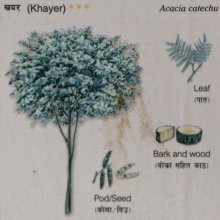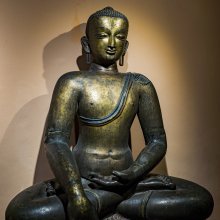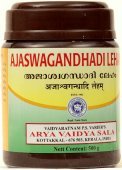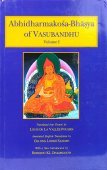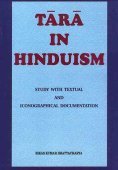Kosha, Kośa, Kosa, Kośā, Koṣā, Kōṣā: 34 definitions
Introduction:
Kosha means something in Buddhism, Pali, Hinduism, Sanskrit, the history of ancient India, Marathi, Jainism, Prakrit, Hindi, biology, Tamil. If you want to know the exact meaning, history, etymology or English translation of this term then check out the descriptions on this page. Add your comment or reference to a book if you want to contribute to this summary article.
Kosha has 33 English definitions available.
The Sanskrit terms Kośa and Kośā and Koṣā and Kōṣā can be transliterated into English as Kosa or Kosha, using the IAST transliteration scheme (?).
Alternative spellings of this word include Kosh.
Images (photo gallery)
Languages of India and abroad
Sanskrit dictionary
[Deutsch Wörterbuch]
Source: Cologne Digital Sanskrit Dictionaries: Böhtlingk and Roth Grosses Petersburger WörterbuchKośa (कोश):—
--- OR ---
Koṣa (कोष):—1. s. u. kośa . Die abgeleiteten und damit zusammensetzten Wörter suche man gleichfalls unter śa .
--- OR ---
Koṣa (कोष):—2. gaṇa pacādi zu [Pāṇini’s acht Bücher 3, 1, 134.] m. Nomen proprium eines Priestergeschlechts [The Śatapathabrāhmaṇa 10, 5, 5, 8.]
--- OR ---
Kośa (कोश):—
1) e) hematri (ratha) [Mahābhārata 8, 1733.] — f) [Varāhamihira’s Bṛhajjātaka S. 46, 23. 50, 5. 10.] — g) jīva [Bhāgavatapurāṇa 10, 82, 47.] — h) balaśca koṣaṃ ca [Mahābhārata 4, 964] fehlerhaft für balaṃ ca kośaśca, wie die ed. Bomb. liest. — l) vgl. bījakośa . — q) genauer Eihaut; vgl. auch [Varāhamihira’s Bṛhajjātaka 4, 15. 5, 4.] — r) [Varāhamihira’s Bṛhajjātaka S. 68, 8.] = muṣka [Halāyudha 2, 368.] — t) pañcaka [Oxforder Handschriften 222,b, No. 540.] — v) vgl. kośavāri und vārikośa . — x) poetischer Schatz, Spruchsammlung, eine Sammlung lose an einander gereihter Strophen [kāvyādarśa 1, 13.] [Sāhityadarpana 565.] Titel einer best. von Vasubandhu verfassten Sammlung von Gāthā [WASSILJEW 220. 285.] — y) Bez. einer best. Conjunction der Planeten [Varāhamihira’s Bṛhajjātaka S. 20, 5. 7. 9.]
Source: Cologne Digital Sanskrit Dictionaries: Sanskrit-Wörterbuch in kürzerer FassungKośa (कोश):——
1) m. *n. (adj. Comp. f. ā) — a) Fuss , Kufe. Auch bildlich von den Wolken. — b) Eimer [Ṛgveda (roth). 10,100,10.] — c) Kiste , Kasten , Truhe. — d) Kasten des Wagens. — e) Degenscheide. — f) Behälter , Verschluss , Gehäuse. — g) Vorrathskammer , Vorrath , Schatzkammer , Schatz. koṣañca [Mahābhārata 4,964.] fehlerhaft für kośaśca. — h) Wörterbuch. — i) poetischer Schatz , Spruchsammlung , eine Sammlung lose an einander gereihter Strophen. — k) Knospe , Blumenkelch , Samenbehälter (insbes. der Lotusblüthe). — l) Schote , Hülse , Schale der Nüsse. — m) *Muskatnuss. — n) *das Innere der Frucht von Artocarpus integrifolia u.s.w. — o) Cocon. — p) Eihaut [Varāhamihira’s Bṛhajjātaka 5,4.] — q) Hodensack ; Du. die beiden Abtheilungen desselben. — r) *vulva. — s) *penis. — t) *Ei. — u) am Ende eines Comp. Kugel , Kugelform. — v) das beim Gottesurtheil angewandte Weihwasser. — w) Eid. — x) Friedensbecher oder -trank. kośam pā so v.a. einen geschlossenen Frieden durch einen Trunk besiegeln [Rājan 7,8,75.460.493,8.283.] — y) eine best. Conjunction der Planeten. — z) der 2te astrologische Haus [Varāhamihira’s Yogayātrā 4,1.] — aa) Titel einer Sammlung von Gāthā (buddh.0 [Kāraṇḍavyūha 98,24.] [Harṣacarita 204,13.] —
2) f. kośī — a) Knospe in arka. — b) *Blattauge. — c) *Schuh. — d) *ein best. wohlriechender Stoff [Galano's Wörterbuch] — e) *eine eiserne Pflugschar [Galano's Wörterbuch]
--- OR ---
Koṣa (कोष):——
1) m. Pl. Nomen proprium eines Priestergeschlechts. —
2) f. ā Nomen proprium eines Flusses [Mahābhārata 6,9,34.]
Sanskrit, also spelled संस्कृतम् (saṃskṛtam), is an ancient language of India commonly seen as the grandmother of the Indo-European language family (even English!). Closely allied with Prakrit and Pali, Sanskrit is more exhaustive in both grammar and terms and has the most extensive collection of literature in the world, greatly surpassing its sister-languages Greek and Latin.
See also (Relevant definitions)
Starts with (+86): Kosaka, Kosam, Kosaphala, Koshabhavana, Koshabhuta, Koshacancu, Koshachanchu, Koshadanda, Koshadasa, Koshadhanya, Koshadhavana, Koshadhipati, Koshadhisha, Koshadhyaksha, Koshadrava, Koshagara, Koshagaradhikarin, Koshagata, Koshagatavastiguhya, Koshagatavastiguhyata.
Ends with (+254): Abhidhanakosha, Abhidharmakosha, Acaryakosha, Adhikosha, Advaitaratnakosha, Agastiko-kosha, Ahikosha, Akasmika-kosha, Akosa, Aksharakosha, Akshaya-kosha, Akshikosha, Akshivartmakosha, Alamakosha, Aluptasattvakosha, Amarakosha, Amsatrakosha, Anadikosha, Anandakosha, Anandamayakosha.
Full-text (+623): Andakosha, Pranamayakosha, Manomayakosha, Anandamaya-kosha, Vijnanamaya-kosha, Pancakosha, Madhukosha, Dalakosha, Vyakosha, Koshashuddhi, Koshakaraka, Jatikosa, Vikosha, Koshadhyaksha, Karakosha, Koshashayika, Koshakara, Koshanga, Netrakosha, Koshagriha.
Relevant text
Search found 133 books and stories containing Kosha, Kaoshaa, Kośa, Kosa, Kośā, Koṣa, Kōśa, Kōśā, Kōṣa, Kōsa, Koṣā, Kosā, Kōsā, Kōṣā, Koshaa; (plurals include: Koshas, Kaoshaas, Kośas, Kosas, Kośās, Koṣas, Kōśas, Kōśās, Kōṣas, Kōsas, Koṣās, Kosās, Kōsās, Kōṣās, Koshaas). You can also click to the full overview containing English textual excerpts. Below are direct links for the most relevant articles:
The backdrop of the Srikanthacarita and the Mankhakosa (by Dhrubajit Sarma)
Part 1 - Sanskrit koṣa texts < [Chapter V - The Maṅkhakośa]
Part 6 - Specialities as a koṣa text < [Chapter V - The Maṅkhakośa]
Amarakoshodghatana of Kshirasvamin (study) (by A. Yamuna Devi)
Introduction (Kośa Literature–A Brief Survey) < [Chapter 1 - Kośa Literature–A Brief Survey]
Post-Amarakośa Lexicographers and Lexicons < [Chapter 1 - Kośa Literature–A Brief Survey]
Mandukya Upanishad (Gaudapa Karika and Shankara Bhashya) (by Swami Nikhilananda)
Mandukya Karika, verse 3.11 < [Chapter III - Advaita Prakarana (Non-duality)]
Taittiriya Upanishad (by A. Mahadeva Sastri)
Chapter XI - Annamaya-kośa < [A - Brahmavidyā expounded]
Chapter X - The Evil and its Cure < [A - Brahmavidyā expounded]
Chapter XII - Prāṇamaya-kośa < [A - Brahmavidyā expounded]
Rig Veda (translation and commentary) (by H. H. Wilson)
Taittiriya Upanishad Bhashya Vartika (by R. Balasubramanian)
Verse 2.730 < [Book 2 - Brahmavallī]
Verse 2.236 < [Book 2 - Brahmavallī]
Verse 2.447 < [Book 2 - Brahmavallī]
Related products
